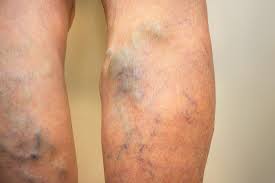Sodipo said varicose veins are dilated veins that occur in the body, usually in the lower limbs of the legs; they are usually due to defective valves.
“The risk factors for the thrombosis or blood clot include injury in the veins or when there is affected bloodflow to the veins or when there is an increasing discomfort or when the number of blood cells increases.
“In a nutshell, the varicose veins could affect the normal integrity of the veins, which is a risk factor for blood clot in the long term because it predisposes people to chronic venous disease,” he said.
Also, a Professor of Haematology and blood transfusion at the College of Medicine, University of Lagos, Sulaimon Akanmu, said varicose veins could increase the risk for blood clot.
“One of the risk factors for blood clot is the sluggishness of flow of blood and when the blood is not flowing as expected, the tendency of a blood clot is high,” said Akanmu, who is also a Consultant Haematologist at the Lagos University Teaching Hospital, Idi-Araba.
Prof. Akanmu said varicose veins occur when the valves in the veins break down, allowing blood to flow backward and collect at certain points.
He added that the condition is more likely to affect the elderly, as age causes the skin to lose elasticity and valves in veins to weaken.
“Obesity and a family history of the condition also increase the risk,” he said.
Sodipo said varicose vein is a common condition among Nigerians, but that “most people do not pay attention to it because they think that it is normal.
“If you look at some people’s legs, especially men, they have very thick veins because, usually, you wouldn’t see the veins but people see it as normal. It’s when it advances into a more severe chronic venous disease that people present to the hospital.
“The varicose veins are early signs of chronic venous disease and when it’s not properly treated, it can lead to a blood clot,” he said.
The physician said the signs one may have varicose veins include veins that are dark purple or blue or veins that appear twisted and bulging. “They are often like cords on your legs,” he noted.
Sodipo said when painful signs and symptoms occur, one can have an achy or heavy feeling in the legs, burning, throbbing, muscle cramping and swelling in the lower legs, pain after sitting or standing for a long time, itching around one or more of the veins and skin discoloration around a varicose vein.
The physician noted that improving circulation and muscle tone might reduce the risk of developing varicose veins.
“You can prevent the condition by exercising, maintain a healthy weight, avoid standing still for too long, and changing the sitting or standing position at regular intervals.
“Anyone who has to stand for their job should try to move around at least once every 30 minutes,” he said.
The expert urges individuals experiencing the signs and symptoms of the condition to see a specialist for an assessment.
“Such patient needs to be evaluated to know what’s increasing their risk of varicose veins and from there, they will either prevent or treat it.
“Treatment includes conservative measures such as compression stocking or medication that helps in reducing pressure in the veins.
“But if it is left unattended to and it becomes serious, it can predispose someone to chronic venous disease, it can lead to painful ulcers that may form on the skin near varicose veins or blood clot,” Sodipo warned.
source: Punch

 Medical experts say patients with varicose veins are more likely to develop a blood clot; and that varicose veins may be an early warning sign of chronic venous disease. Varicose veins are enlarged, swollen, and twisting veins, often appearing blue or dark purple. They happen when faulty valves in the veins allow blood to flow in the wrong direction or to pool.
Medical experts say patients with varicose veins are more likely to develop a blood clot; and that varicose veins may be an early warning sign of chronic venous disease. Varicose veins are enlarged, swollen, and twisting veins, often appearing blue or dark purple. They happen when faulty valves in the veins allow blood to flow in the wrong direction or to pool.




